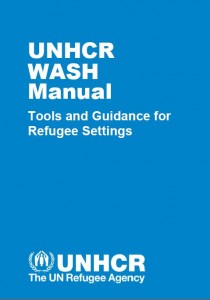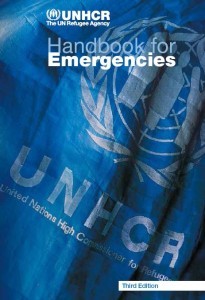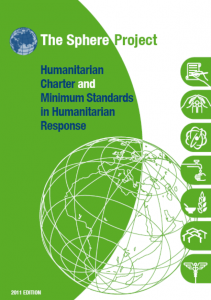
The Sphere Handbook is one of the most widely known and internationally recognized sets of common principles and universal minimum standards for the delivery of quality humanitarian response.
Tags: Bathing Facilities, Capacity Building, Communal Toilets, Cross Cutting, Disability, Disease Vector Control, Drainage, Environment, Excreta Management, Gender, Gender Based Violence, Grey Water Disposal, Handwashing with Soap, Household Water Treatment, Human Right to Water / Sanitation, Hygiene Promotion, Laundering Facilities, Menstruation Hygiene Management, Piped Water Networks, Protection, Public Health, Solid Waste Management, WASH Assessments, WASH Coordination, WASH Monitoring, WASH Programme Management, Water Quality Testing and Surveillance, Water Safety Plans, and Water Supply. Languages: English. Organisations: SPHERE. Categories: WASH Reference Documents.
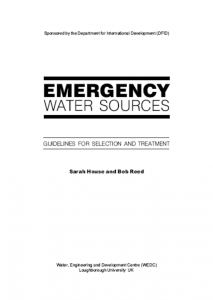
These guidelines have been designed to help those involved in the assessment of emergency water sources to collect relevant information in a systematic way, to use this information to select a source or sources and to determine the appropriate level of treatment required to make the water suitable for drinking.
Tags: Boreholes, Bulk Water Treatment, Drilling, Groundwater, Hand Dug Wells, Handpumps, Household Water Treatment, Piped Water Networks, Rainwater Harvesting, Solar Pumping, Spring Protection, WASH Assessments, WASH Monitoring, WASH Programme Management, Water Prospection and Investigation, Water Pumping, Water Quality Testing and Surveillance, Water Safety Plans, Water Storage, Water Supply, and Water Tankering. Languages: English. Organisations: WEDC. Categories: WASH Emergency Guidelines and WASH Reference Documents.
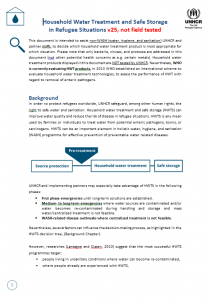
This document contains guidelines to help WASH actors in refugee settings select household water treatment products. The document includes an overview of: • Categories of HWTS; • Health benefits; • When to use HWTS and existing decision tree; • Criteria regarding HWT to be considered by the field; • Mandatory components; • UNHCR Checklist for HWTS; • HWT concerns; • Household water treatment cards; • Safe water storage;• Further reading; • Acknowledgement
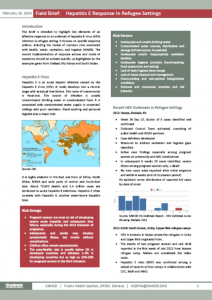
This brief is intended to highlight key elements of an effective response to an outbreak of hepatitis E virus (HEV) infection in refugee setting. It focuses on specific response actions, including the review of common risks associated with health, water, sanitation, and hygiene (WASH). The overall implementation of response actions and mode of operation should be context specific, as highlighted by the examples given from Dadaab (Ifo) Kenya and South Sudan.
Tags: Bulk Water Treatment, Excreta Management, Handwashing with Soap, Household Water Treatment, Hygiene Promotion, Public Health, Water Quality Testing and Surveillance, and Water Safety Plans. Locations: Africa, Dadaab, East and Horn of Africa, Kenya, South Sudan, and Sudan and Chad Special Operational Region. Languages: English. Organisations: UNHCR. Categories: WASH Emergency Guidelines, WASH Guidelines, WASH Operational Guidelines, WASH Policy Guidelines, and WASH Reference Documents.
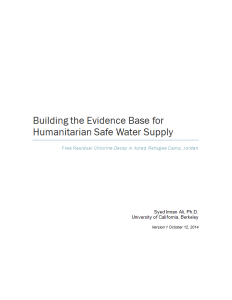
Current emergency safe water guidelines are based on little field evidence. We launched an observational study on chlorine decay in the Azraq refugee camp, Jordan in July-August 2014 in order to: i) develop evidence-based guidelines for centralized batch chlorination in humanitarian operations; and ii) identify factors affecting the safe water chain. This study builds on earlier work from South Sudan and adds to the evidence base that study initiated.
 English
English






